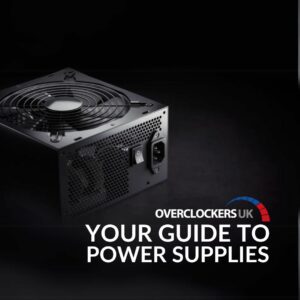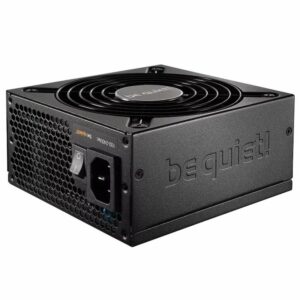The power supply unit is a vital component of our gaming PC. But which model is the right one for you? There are many facets to that answer, and here we’re looking at 80 PLUS ratings.

The 80 PLUS rating is a certification system that signifies how efficient your chosen PSU is. In this article, we’re taking a closer look at what they mean and how this rating should affect your choice.
Power Supply Units: What It Is and What It Does
Before getting into the 80 Plus ratings, I’m going to bring it back to the basics. What is a PSU and what does it do? Pretty much exactly what it says on the tin, the PSU supplies power – what a revelation! Power supply units are the component in your gaming computer which takes the electricity from your mains, and channels it into the other components. More accurately, they’re power converters, as they change the AC current from the mains into a more manageable DC current. Not only that, it regulates the DC voltage output as the various components have different voltage requirements. A clever piece of kit, in all!
When it comes to purchasing the right PSU, there are a number of things to consider. First and foremost, you need to make sure it’s a form factor that will fit within your case, as they come in a variety of sizes. It’s all well and good buying an ATX PSU, but if your case is a Mini-ITX, then you may run into some problems! Next, you need to decide if you want a modular, semi-modular, or non-modular PSU that has fixed cables that cannot be removed. Of course, the other two key factors are wattage and 80 PLUS rating, both of which we will be addressing in more detail below.
We have plenty of great blogs dedicated to all things power supplies if you wanted to read up on the ins and outs.

Alternatively, we have a one-stop shop guide to all things power supplies, too.
What Wattage?
Wattage is probably the most complicated thing to work out. Thankfully, we have a wattage calculator and a helpful guide to help you figure out just how much power your system will need. Typically, you would need a PSU that outputs double the power of your system. Therefore, if your PC operates at 300W, you’d be looking to get a 600W power supply unit. This will more than provide you with what you need and allow headroom for overclocking or upgrades. PSUs tend to run most efficiently when not operating at the maximum voltage, too.
After that, it’s plain sailing, right? Ehhh, nearly. Lastly, there is the 80 PLUS Rating to take into consideration.

80 PLUS What Now?!
I have thrown the term “80 PLUS Rating” around a few times now, and I guess it’s time to explain it. Established in 2004, the 80 PLUS rating is a measure of the power supply’s energy efficiency. Stated simply, a PSU needs to run at a minimum of 80% efficiency when at 20%, 50%, and 100% loads. Originally, there were three ratings – Bronze, Silver, and Gold, each showing incremental improvements in efficiency. Since then, there have been three more ratings added as the desire for the ultimate power efficiency has driven manufacturers to make bigger and better PSUs. In 2012, the Titanium rating was introduced, operating at an amazing 94% efficiency!
Before getting into the nitty-gritty of what your gaming computer needs, here is a table detailing the required specifications for each 80 PLUS rating. From Standard all the way up to Titanium.
| 80 PLUS Rating | 10% Load | 20% Load | 50% Load | 100% Load |
|---|---|---|---|---|
| Standard | n/a | 80% | 82% | 80% |
| Bronze | n/a | 82% | 85% | 82% |
| Silver | n/a | 85% | 87% | 85% |
| Gold | n/a | 87% | 89% | 87% |
| Platinum | n/a | 90% | 90% | 89% |
| Titanium | 90% | 92% | 94% | 90% |

Getting the PSU Right Rating for You
Typically, the focus is the performance at 50% load. The 80 PLUS Rating a PSU earns is based on this. If you refer back to our table, you can see how efficient each PSU is at 50%. Heck, we’ve even screen-grabbed it and outlined the box for you!

The current thinking is that most gaming PCs won’t need to exceed the Silver or Gold 80 PLUS rating, as this provides all the energy efficiency you’ll ever need. PCs using more energy-demanding components, like AMD Threadrippers or multiple graphics cards, would need a higher-rated PSU to keep up with the requirements of the components. Most retailers, ourselves included, tend to focus on offering Bronze as a budget option and Gold as a premium, so this is what I shall be sticking with today.
As the simplest rule of thumb – the higher the price tag, the higher the efficiency, the better the power supply unit performs. In an ideal world, we would all be equipping our battle stations with Titanium rated PSUs, because the cheeky added benefit of a more efficient PSU is that they are kinder on your electricity bills. Alas, however, the Titaniums are not initially kind to the purse strings. The immense structural and circuitry improvements made to gain even the 5% efficiency are astounding, hence the hefty price tag.
Power Supply Units: Bronze vs Gold
After using the wattage calculator, most average builds will find that they need a power supply unit operating between the 600W to 850W range. These will keep most mainstream components happy, like NVIDIA RTX 40 Series GPUs and AMD Ryzen 7000 Series CPUs. Naturally, the more powerful the model, the more juice you’ll need.

It should be noted that the RTX 40 Series also comes with its own requirements and specification needs. You can learn all about this, ATX 3.0, and 12VHPWR in our dedicated blog.
If you are looking to build a behemoth, 8Pack-style gaming PC then you’ll want a much higher wattage. This is where you would need a 1000W+ power supply, with a better 80 PLUS rating to boot. However, if you are already using older gen tech, then 600W to 850W will most likely power an SLI or CrossFire setup. Bear in mind, though, that some older generation GPUs are not as energy-efficient as the newer tech, they just take less juice to power them.
In the end, it all comes down to what you need and what you have to spend. Ideally, it’s best opting for known brands with a good reputation, as it is your gaming PC at stake here! Do take some time to read the reviews of the product. That way you won’t be stuck with a dud PSU. We have a quick table breakdown of Bronze and Gold PSUs so you can easily compare the two:
| Bronze | Gold | |
|---|---|---|
| Efficiency | 85% | 89% |
| Average Wattage | 650W | 850W |
| Popular Brand | be quiet! | Seasonic |
| Cable Management | Semi-Modular | Modular |
| Best for… | Building on a budget | High-end GPUs |
| Common Form Factor | ATX | ATX |
One More Thing…
Thankfully, pretty much all power supply units today come with an 80 PLUS rating, meaning if you have any particular brand loyalty, you’ll be set. There is, however, the ever-important consideration of aesthetics. You’re so close to getting the perfect PSU – don’t fail at the last hurdle! Generally available in black or white, certain models also have RGB lighting. Now, if your case is entirely metal, this isn’t really something to consider – you jump on ahead to my recommendations below! For those of you sporting tempered glass or mesh panels, read on.

Glass and mesh panels are an excellent way of showing off show-stopping components and RGB lighting. Why not add your power supply unit to this list? Elevate its appearance to show the importance of this component. As far as we are concerned at Overclockers UK, there is no such thing as too much RGB lighting.
Being able to see into cases makes cable management a more pressing issue. Power supply units can come in modular or semi-modular designs, meaning that you pick and choose which cables you need plugging in. This helps keep interiors looking slick thanks to the lack of clutter and unnecessary wiring.
The Best PSUs at Overclockers UK
Now, the bit you have all been waiting for: the shopping list! I mean, the inspiration for your shopping list. Below, I shall be highlighting power supplies that hit 600W and 850W, in both Bronze and Gold ratings. If you have bigger power needs or just aren’t feeling these models, you can peruse our entire selection of PSUs with just the click of a button.

600W: 80 PLUS Bronze
Kolink Modular Power Supply
- Semi-modular
- 546W and 45.5A on a 12V rail
- ATX form factor with a length of 160 mm
- Connectors: 1 x 24-pin, 1 x 4+4-pin, 2 x 6+2-pin, 4 x SATA, 2 x Molex
600W: 80 PLUS Gold
be quiet! SFX-L Power 600W 80 PLUS Gold Modular Power Supply
- Modular
- 50A single rail
- Form factor SFX-L
- Connectors: 1 x 20+4-Pin, 1 x 4+4-Pin, 4 x 6+2-Pin, 6 x SATA, 3 x 4-Pin-Molex


850W: 80 PLUS Bronze
Seasonic B12 BC-850 Power Supply
- Fixed cables
- ATX form factor
- Active Power Factor Correction with Smart and Silent Fan Control
- Connectors: 1 x 20+4 pin, 6 x SATA, 3 x 4 pin Molex, 4 x 6+2 pin, 1 x 4+4 pin
850W: 80 PLUS Gold
Kolink Regulator 850W 80 Plus Gold Gen5 Modular Power Supply
- Fully modular
- ATX 3.0 with 12VHPWR 600W cable
- 120mm fan with fluid dynamic bearing
- Connections: 1 x 16-pin, 4 x 6+2-pin, 6 x SATA, 4 x 4-pin Molex

Just for fun, here is a look at a Titanium rated, 1000W+ power supply unit – to see how it compares!

1000W+: 80 PLUS Titanium
Asus ROG THOR 1600W 80 Plus Titanium Modular Power Supply
- Fully modular
- Quietest 1600W PSU with 135mm PWM fan
- ATX12V form factor
- Connections: 1 x 24/20-pin, 2 x 4+4-pin, 1 x 16-pin PCIe, 10 x 6+2-pin PCIe, 12 x SATA, 6 x Molex
Ready to Power Up?
What is your 80 PLUS sweet spot? Let us know your wattage and rating in the comments below!



